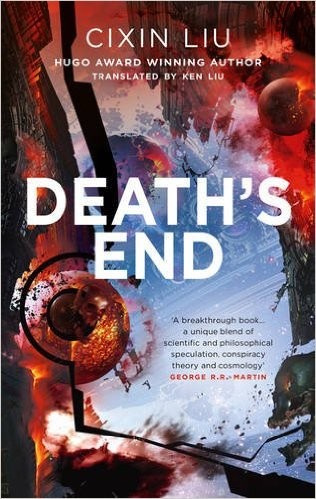Sami Sundell reviewed Death's End by Cixin Liu (Remembrance of Earth's Past, #3)
Review of "Death's End" on 'Goodreads'
2 stars
Wrapup of the Remembrance of Earth's Past trilogy focuses on the life and decisions of Cheng Xin, a lone woman traveling through time (via freezer) and spiraling towards the end of humankind.
I read [b:The Three-Body Problem|20518872|The Three-Body Problem (Remembrance of Earth’s Past, #1)|Liu Cixin|https://images.gr-assets.com/books/1415428227s/20518872.jpg|25696480] two years ago, when it was nominated for a Hugo Award, and thought it was clumsy in its science and tedious in story-telling. I happily skipped [b:The Dark Forest|23168817|The Dark Forest (Remembrance of Earth’s Past, #2)|Liu Cixin|https://images.gr-assets.com/books/1412064931s/23168817.jpg|42713958], but now that Death's End was again nominated for Hugo, I decided to give this third part of the series a go.
Luckily, Death's End doesn't really rely on The Dark Forest - or on The Three-Body Problem, either. There are some basic concepts that are useful, but since the last book focuses on Cheng Xin and, through her, humanity, it's a self-contained story.
And... I didn't like it any better than The Three-Body Problem. The book has absolutely huge, dramatic events, but story-telling seems completely disinterested. Cheng Xin is described to be very emotional, but it didn't manage to evoke any emotions in me, the reader.
One of the problems is that the story is unbelievable in multiple levels. The humanity is depicted as misanthropic and self-involved, where it's every man for himself. Time and time again people get exterminated, and time and time again that's somehow forgotten.
And in many of those occasions, it's Cheng Xin who has the final say on what to do - and every time she chooses wrong. Broken, she runs to a freezer, sleeps a handful of years, wakes up, and is presented with another decision she can choose poorly on.
In a weird sexist move, when there's a peace for a few decades, humankind turns completely feminine - and the book makes it clear that's a weakness. When the peace ends, men magically recover their masculinity.
And, as with The Three-Body Problem, there's plenty of discussion about dimensions, and it still makes as little sense as it did in the first book.
Death's End presents us with some great ideas. It has some side plots that I would kind of like to see explored. However, after reading these two books, even if I saw a book about the fate of the galactic humans, I'd have hard time convincing myself to read it.

